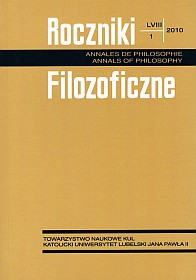The Problem of Evil and Frédéric Bastiat’s Revision of Modernity
Abstract
This paper seeks to show Frédéric Bastiat’s views against the backdrop of his epoch. He lived in the first half of the nineteenth century, in the period when the rationalistic paradigm was submitted to a revision. In line with this paradigm, the social order is constructed above all on the foundation of institutions. Hence the ideas to construct new social communities deprived of private property, communities that live in conformity with an imposed and prearranged model.
Bastiat criticises such ideas and points instead to the natural forces of progress inherent in each individual human being and in natural communities that this being established. The French thinker refers – unlike Rousseau – on the one hand to the fact of evil and imperfection, and on the other to our inherent drive towards good and perfection, i.e. our perfectibility. Evil and imperfection of human nature are our driving and creative forces. On the way to progress, planned by the Creator, the individual is governed by the principles of responsibility and solidarity, and seeks to integrate the areas of knowledge and faith. The communities that individuals establish result from their struggle against evil in all dimensions.
References
Bastiat F.: Dzieła zebrane, tłum. J. Kłos [i in.], t. I-II, Warszawa: Prohibita 2009.
Bastiat F.: Co widać i czego nie widać, [w:] Dzieła zebrane, tłum. J. Kłos [i in.], t. I, Warszawa: Prohibita 2009, s. 11-58
Bastiat F.: Prawo, tłum. G. Dziaczkowska, Lublin–Rzeszów: Wyd. Dextra 2003.
Bastiat F.: Political Economy, tłum. ang. S. Cain, New York: The Foundation for Economic Education 1975.
Bloom A.: Jean Jacques Rousseau, [w:] History of Political Philosophy, ed. L. Strauss, Chicago: Rand McNally & Company 1972.
Constant B.: Œuvres, Paris: Éditions Gallimard 1957.
Crosby J.F.:, Zarys filozofii osoby, tłum. B. Majczyna, Kraków: Wydawnictwo WAM 2007.
Cubbedu R. & Masala A.: Natural Right, Providence, and Order: Frédéric Bastiat’s Laissez Faire, „Journal des économistes et des études humaines” 11 (2001), nr 2/3, s. 311-336.
Habermas J.: Filozoficzny dyskurs nowoczesności, tłum. M. Łukasiewicz, Kraków: Universitas 2000.
Hayek F.A. von: Nadużycie rozumu, tłum. Z. Siembierowicz, Warszawa: Oficyna Wydawnicza Volumen 2002.
Herbert R.F.: Frédéric Bastiat – “A Man for all Reasons”, „Journal des économistes et des études humaines” 11 (2001), nr 2/3, s. 253-256.
Horkheimer M.: Początki mieszczańskiej filozofii dziejów, tłum. H. Walentowicz – cyt. za: A. Renaut, Era jednostki. Przyczynek do historii podmiotowości, tłum. D. Leszczyński, Wrocław: Ossolineum 2001.
Hudzik J.P.: Czy Europejczyk może zostać Indianinem? Filozofia a problem kolonializmu kultury zachodniej, „Kultura Współczesna” 2002, nr 1-2 (31-32), s. 5-31.
Kołakowski L.: Główne nurty marksizmu, cz. I-II, Poznań: Zysk i S-ka 1976.
Lévinas E.: O Bogu, który nawiedza myśl, tłum. M. Kowalska, Kraków: Wydawnictwo Znak 1994.
Mises L. von: Ludzkie działanie, tłum. W. Falkowski, Warszawa: Instytut Ludwiga von Misesa 2007.
Mitchell W.C. & Simmons R.T.: Beyond Politics. Markets, Welfare, and the Failure of Bureaucracy, Boulder: Westview Press 1994, .
Newman J.H.: Pope and the Revolution, London: Longmans 1866.
Newman J.H.: Discussions and Arguments, London: Longmans 1924.
Novak M.: The Universal Hunger for Liberty. Why the Clash of Civilizations is not Inevitable, New York: Basic Books, 2004.
Paul-Dejean J.-C.: Les années de formation de Frédéric Bastiat (1801-1844), Paris: Institut Euro 92 1997.
Randall J.H.: The Making of the Modern Mind, Boston: Houghton Mifflin Company 1926.
Renaut A.: Era jednostki. Przyczynek do historii podmiotowości, tłum. D. Leszczyński, Wrocław: Ossolineum 2001
Safranski R.: Zło. Dramat wolności, tłum. I. Kania, Warszawa: Czytelnik 1999
Taylor Ch.: Źródła podmiotowości, tłum. M. Gruszczyński [i in.], Warszawa: PWN 2001.
Copyright (c) 2010 Roczniki Filozoficzne

This work is licensed under a Creative Commons Attribution-NonCommercial-NoDerivatives 4.0 International License.





